This page last updated
Wednesday, March 19, 2025
|
The
following article appeared in the Courier-Journal Magazine on February 28,
1988. |
|
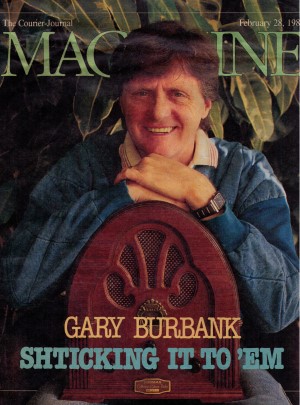
Gary Burbank
Schticking It To 'Em
By Vince Staten
Yes, radio fans, he's alive and
incorrigible in Cincinnati, driving deejays in Columbus crazy, and he just
may be on the brink of the big time.
Remember Rodney Floored and Arnie Barnold?
How about Eunice and Bernice, the Siamese sisters connected at the
telephone?
And the Rev. Deuteronomy Skaggs of the Little Radio Church of the White
Winged Gospel Truth, who would beseech his followers: "Don't make me
holler/Don't make me shout/Turn them pockets inside out/And shoot the loot
to the Lord"?
If you remember them, then you remember Gary Burbank. From 1968 to 1980,
with three years out to discover he didn't want to work in management, Gary
Burbank was Louisville's most talked about deejay.
He discovered snow sharks in the powdery drifts during the winter of '79.
He discovered Chicken John and Phyllis America in the Kentucky governor's
mansion.
He has been gone for seven years, but not forgotten, particularly for anyone
with a decent AM radio. You can pick up his afternoon comedyfest on WLW-AM
(700) in Cincinnati.
And if you've been listening you know that he is at it again.
Burbank is satirizing the politics of resistance with a new character, "Earl
Pitts, American." Pitts' daily commentaries are being syndicated nationally
by Dorsey and Donnelly Enterprises of Dallas. Twenty stations from
Wenatchee, Washington to Jacksonville, Florida, already carry Earl.
"For a new product this is very, very quick development," says Pat Clark,
assistant vice-president in charge of syndication at Dorsey and Donnelly.
"Hiney Wine (a spoof on wine commercials) is considered the most successful
syndicated product in radio history. And in the first six months we
syndicated it, 26 stations signed up. We have been syndicating Earl Pitts
for just three months."
At last, it looks as though Gary Burbank may be getting the national
recognition that has long been predicted for him.
Of course, it has looked that way before.
In 1980, when Burbank was still working at Louisville's WHAS-AM, his novelty
record "Who Shot J.R.?" was on the Billboard charts and he was on the John
Davidson show. Then it was all dashed in a legal skirmish with the record's
producer.
Over the years there have been TV pilots, novelty records, song spoofs. But
nothing ever clicked big time.
"Gary Burbank may be the most talented person not to be a major star in this
country," says Bob Moody, former colleague and competitor in Louisville
radio. Moody is now operations manager at WPOC Baltimore, and he carries
Earl Pitts.
In an industry where back-biting is the norm, Gary Burbank gets pats from
competitors and colleagues along.
"He is one of the greatest talents in our business," says Dan Dorsett,
general manager of Lexington's WLAP. "One of the highlights of my young days
in broadcasting was I got to go in once and watch him work."
Ed Henson, general manager of Louisville's WAVG-AM, says "I'm a big fan of
his. We've tried to hire him several times, as has most everybody in this
market."
"Burbank probably helped more deejays get their starts than anybody
anywhere," says Steve Cook, who was recommended to WAKY after Burbank
stopped for gasoline in Shelbyville, Kentucky, and heard Cook on the local
station.
Burbank is universally admired for his wit,
wisdom and work ethic.
Well, almost universally admired. "The jocks in Columbus [Ohio] hate me,"
says Burbank. That's because in its recent "best" and "worst" issue,
Columbus magazine named Burbank the Best Disc Jockey in Columbus. It really
isn't such an outrageous award. WLW's powerful 50,000 watt signal thunders
into Columbus, and Burbank attracts 5 percent of the audience, good enough
for third place in the afternoon in the Columbus ratings.
He owns afternoons in Cincinnati. His show attracts 12 percent of the
audience. "Last year at Christmas we sold 8,000 cassettes of his bits," says
WLW's Dave Reinhart, program director at WLW and Gary's current boss.
In Dayton, he has a 7 percent share and the Number 6 afternoon ranking. In
Lexington, Kentucky, he has a 1.6 share, good for 13th place.
If the WLW signal were stronger in Louisville, you can bet he'd show up in
the ratings here.
The reason for his success is simple. "He is so good because he is talented,
and because he works hard at it," Henson says.
Burbank doesn't go on the air until 2 p.m., but his day usually begins
around 7 a.m. He sits in the kitchen alcove of his Northern Kentucky home,
sipping coffee and scribbling down last-minute thoughts for comedy bits.
Burbank usually arrives at the WLW studio around 10 a.m. His producer, Kevin
"Doc" Wolfe, will have everything laid out for him: scripts neatly filed in
a folder, commercial tapes stacked in order.
Burbank and Wolfe work from the time Gary arrives until 1 p.m. recording the
day's comedy bits. "We have to be done by 1 with the creative stuff,"
Burbank says. "Then we edit 'til 1:30. I go off and read for half an hour:
news, anything I can find for live stuff." Much of Burbank's material is
tightly scripted, by Burbank, by Wolfe or by two writers Burbank employs on
his own.
One think Burbank is scrupulous about is crediting his material. "Sometimes
when you talk to Gary you think he's obsessed with people stealing his
stuff," Moody says. "But there is a lot of truth to what he says."
A recent issue of USA Today noted the discovery of snow sharks in Toledo by
a local deejay. Louisvillians remember Gary Burbank was doing that bit
almost a decade ago.
"We've had a number of amazing coincidences with the American Comedy
Network," says Burbank. "After we came out with Earl Pitts, they had
Spangler Pitts, American. I just say, 'It's an amazing coincidence.'"
The end product of Burbank's long hours is a radio show unlike anything else
on the air.
"On a good day, we'll play four or five records," Burbank says.
The rest of the show is filled with news, weather, sports, traffic and
comedy, comedy, comedy. Part of it is recorded, part spontaneous. And it
isn't just all Burbank and Wolfe.
"Listeners are what make this show," says Burbank. "There's one guy who
calls himself the Reverend G.I. Lovemoney. He calls from his car phone. My
show's an outlet for the regular guys who should be in show business. They
know if they come up here with something funny they can get on here."
Burbank and Wolfe do basically what they want to on the air. "As long as you
have good numbers, you can get away with it," says Burbank. He gets away
with more than almost anybody. He mocks politicians and celebrities, sasses
commercials, even introduces the sacrosanct news with a cut from "Rocky &
Bullwinkle": "Now here's something we hope you'll really like."
He can always get away with it because his hard work and talent have made
him the Number 1 disc jockey in town.
"He grew up on the rough side of the tracks, so he's used to hard work,"
says John Randolph, owner of WKLO in Danville, Kentucky, and WKX in
Eminence, Kentucky. Twenty years ago, when he was Johnny Randolph, he helped
bring Burbank to Louisville's WAKY.
|
You Can't Beat Him
With a Schtick
Here are four new tricks from Gary
Burbank's comedy bag:
Gilbert Gnarley (pronounced NAR-lee with as much nasal
intonation as possible) may be Burbank's best character ever. "He is a
pathetic character," says Burbank. "His main friend is his dog, the
Amazing Cresbo. Gilbert was picked on as a kid. And now his whole
thing is people don't listen to him."
So to get them to listen to him, Gilbert calls them on the phone. He
called Sears to point out that his new solar-calculator would be
obsolete when the sun burns outs, and suggests a consumer warning
label to that effect on the calculator. He called a Las Vegas travel
agency to ask about replacing his "lost" travelers checks. After he
explained that he lost them playing blackjack, he still convinced the
agent he was real.
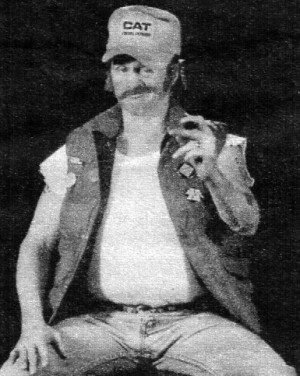
Earl Pitts
Earl Pitts, American, his
wife, Pearl, and their boy Earl Junior (little E.J.) are red of neck
and proud of it. Give a listen to Earl:
"You know what makes me sick? You know what makes me so angry I could
tear the pouch off a marsupial? Those newfangled sporting goods
stores…[I went in one] and asked what kind of shell to use on
neighborhood dogs, and the fellow says, 'I don't know anything about
ammunition, I'm a personal fitness adviser…." They sell these
Yuppie-butts rowing machines that you row all day and not go nowhere.
And bicycling machines that you can bicycle all day and not get
anywhere…. Ever' night the sporting goods store owners of America must
get down on their knees and say, 'Thank you, Lord, for making all the
rich people so stupid.' I'm Earl Pitts, American."
Big Fat is short for "the big fat balding guy with a stubby
cigar…and his pants half zipped." He is Burbank's answer to the
late-night TV hucksters who interrupt movies to pitch waterbeds. Big
Fat breaks into records to sell his latest product, ending each pitch
with "This time I'm being honest wit' you." Burbank says, "His best
one was selling replacement replacement windows to replace the
replacement windows he sold you six months ago, with the guarantee
written in Latin."
"Sports or Consequences": At 4 p.m. each weekday the Gary
Burbank Show goes from duet to full house. The control room fills with
people from around the WLW offices. It the gang can't answer a
caller's sports question, the caller wins a prize. Usually someone
knows the answer, and the crowd unites in a cheer that has become the
"Sports or Consequences" Anthem: "We don't, we don't, we don't mess
around." |
Gary Burbank was born William Purser on
July 29, 1941 in Memphis, the son of a fireman and a housewife. "My dad was
also a songwriter. He had a couple of things recorded. He was a bit of a
poet."
Billy Purser grew up in the Memphis of the '50s, a red hot music town. "At
one time Elvis lived in the same neighborhood," says Purser, er, Burbank.
"Johnny Cash was on my paper route. He didn't take the paper though."
He learned to play the guitar and sing. And while he was in high school, he
started his own band, Billy Purser and the Red Hots.
"I wasn't the class clown until I got into radio," Burbank says. "I knew I
had it inside me to be funny, but I was afraid to. There were a lot of hoods
in my class. I didn't want to make fun of a guy with a tire tool in his back
pocket."
After completing high school in 1959, he joined the Army. "We went across to
Europe on a troop carrier. I kept throwing up everywhere. Somebody mentioned
there was an opening for a drummer. I knew how to hold the sticks. I was
coordinated enough to keep the beat a little bit. I talked myself into the
job so I wouldn't have to do any of the hard jobs, like swabbing the deck."
He was discharged in '62, but the only skill the Army had taught him was
playing drums. "I went back to school, Memphis State. I finally decided
after two semesters I knew everything so I dove in all the way at being a
musician."
He did session work at Stax records and played with such Memphis music
legends as Rufus Thomas, Ace Cannon and Gene Simmons. Then he became the
drummer in the Mar-Keys shortly after they had a hit with the instrumental
"Last Night."
"We were a pretty big name group, but I was still destitute. It was before
things got cushy for musicians. I did it at the wrong time. We didn't even
have roadies. I remember tearing down my drums after a show and I said,
'Hey, how about some help?' The sax player looked at me and said, 'You
picked your instrument.'"
Music is a long road, and unless you have a big hit or a big bank account, a
hard road. "I made a living But I knew that a sideman of my ability wasn't
going to make the kind of money to support a family." And Burbank now had a
wife and a son.
He remembers the night when he hit upon his
life's work.
"The band was doing a job with the Heart Fund in Somerville, Tennessee. It
was put together by this disc jockey. After it was over we were looking for
the guy to give us our money, and the last I saw was his tail lights heading
over the hill. And I said, 'That's what I want to be.'"
He quit the band and went to radio school while working two jobs to support
his family.
After graduating, he took a job at KLPL-AM in tiny Lake Providence,
Louisiana. "On Sundays I signed the station on and off. I got drunk one
night and didn't have time to go home and change, so I went directly to the
station. I put on an Andy Williams record and went to sleep. I slept for two
hours and the whole time I'm playing the record label, ch-thump, ch-thump,
ch-thump. When I finally woke up, I turned on the mike and said, 'That was
Andy Williams.'"
He wasn't fired, but he knew his days were numbered. "I've never been fired.
I've always left right before."
He headed west to Monroe, Louisiana, then back east to Jackson, Mississippi,
before landing in Memphis and WDIA, the soul station. "I was Johnny Apollo,
your blue-eyed soul brother on the front row, putting slide in your glide,
dip in your hip, bump in your rump, always playing scoot-your-bootie,
roll-your-belly music."
He put some slide in his own glide and slid on back to Jackson, then scooted
his bootie back up to Memphis to WMPS. "At 'MPS I got off at 9 in the
morning but I had to hang around an hour and a half to do production if
there was any. It started out I'd sit in the lobby. They said, 'We don't
want a disc jockey in the lobby. It looks bad.' So I'd hang around in the
hall. They said not to do that either, it looked bad. So I ended up spending
that time in the bathroom. I was ready to leave."
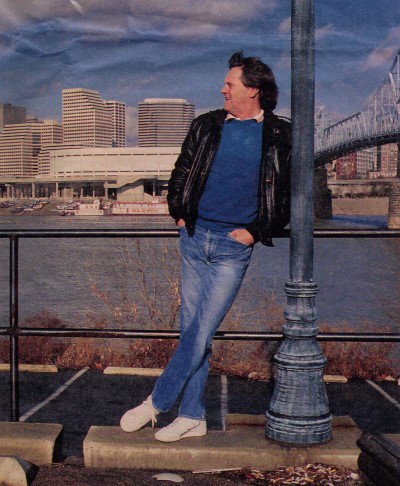
When the offer came from WAKY in
Louisville, he leaped at the chance.
He arrived in the fall of 1968, a skinny Southern kid with a huge voice and
not much else. "He was using the name Johnny Apollo then," remembers
Randolph. "We didn't like that name. Plus there was already a Johnny
Randolph and a Johnny Walker in town it would be too many Johnnies."
So Randolph sat down to conjure up a new name. "At the time 'Laugh-In' was
very popular. Gary Owens was the announcer, and he'd always introduce the
show with 'This is Gary Owens live from beautiful downtown Burbank.' I
thought Gary sounded a little bit like him, so I just tied the two together.
Gary Owens from beautiful downtown Burbank…Gary Burbank from beautiful
downtown Louisville."
Randolph even had him dressing like Gary Owns. "WAKY had that studio with a
window where people could see you," says Burbank. "I had to wear glasses and
a suit for a year. A lot of people actually thought I was Gary Owens. I
still meet people who think I was on that show."
Burbank did his part to further that belief. "Laugh-In" was shown nationally
on Mondays, but WAVE didn't carry it until later in the week.
"He had his mother sending audio tapes of "Laugh-In" from the Memphis
station," Randolph says. "Then he would come on and do the 'Laugh-In'
material. Owens would do the same stuff on TV, and it would look like Owens
was copying off him. He used every angle."
Randolph recognized Burbank's potential and
set out to hone his talent. The first thing was to teach him about timing.
"Be concise. That's what we preached at WAKY: Don't draw it out, get it down
to Reader's Digest size."
Burbank sopped up the technical stuff, how to keep a show moving, how to use
his diaphragm, but the maturation wasn't complete. He still wasn't "Gary
Burbank." And he knew it.
"I was just doing stupid deejay humor at the time," he says. "I would listen
to Skinny Bobby Harper [another WAKY deejay] and just marvel at the stuff he
was doing. It was absolutely brilliant stuff. Finally one day I asked him,
'What do you call that, the stuff you do?' He looked up at me and he smiled,
'Satire.'"
It was an epiphany. Satire. No more stupid deejay humor. Gary Burbank, who
had always read widely, who had always joked about the foibles of local
politicians, altered his humor. It was no longer the old deejay stuff, "Did
you hear what the mayor said last night?" Now he began using voices and
creating fictitious characters and entire scenes.
Gary Burbank had arrived. But his first marriage hadn't survived the trip.
(His son is now a Marine.)
Burbank has since remarried. He met Carol Anderson, his current wife, during
his WAKY years.
"Gary was a real rounder before he married Carol," says Randolph. "He was
really hurting himself, staying out late, abusing his body."
"And he was also probably the world's worst money manager," Moody says. "He
was always broke."
To illustrate Burbank's nonchalance about money, Randolph tells a story
about negotiating Gary's contract.
"I said, 'Gary, what do you want? We're proposing to give you a 10 percent
raise.' 'Oh, yeah, fine,' he said. 'There are other things we can do for
you, material things outside of money,' And he said, 'Well my ex-wife is
driving me crazy. Her refrigerator doesn't work. Could you get her a
refrigerator? Used is all right." And we said, 'Yeah we can do that.' And he
said, 'And storage space for my boat.' We would have given him a lot of
things, and here he is asking for a used refrigerator and space for his
boat.
"And the third thing he wanted was to get his old yellow Cadillac
reupholstered. We had a trade-out [an exchange of advertising time for goods
or services] so he takes it down to the Seat Cover King, and they take the
seat out and there's all these uncashed paychecks." Six.
Burbank owns up to financial irresponsibility. "When we got married, Carol
had been a secretary for two years. I had been making $30,000 for four or
five years. We sat down to put our finances together. She had saved
$2,000…and I owed the bank eight bucks."
In Louisville, Gary Burbank found his style, satire. With the steadying
influence of his new bride, he was ready to focus his energies on his
career.
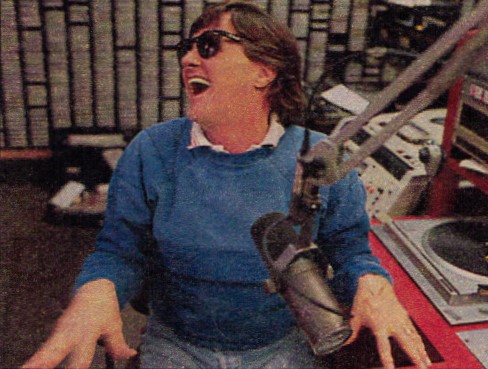
In 1973, Burbank took a job as program
director at WNOE in New Orleans. "That was the most fun place I ever
worked," remembers Burbank "It was an insane station. We could do what we
wanted because no one listened. Before we got there the owners wanted to
turn it into a catfish farm."
They made fun of radio. Another station in town had a Fortune Phone Call
Cash Jackpot. Burbank invented the No Fortune Phone Call Cash Jackpot. He
would call people and tell them they would win if they didn't know how much
was in the other station's jackpot. "We were doing a parody of radio, and in
eight months it went to Number One."
"He did well in New Orleans," Randolph says. "But Gary is not good at
playing politics, and doesn't like to. And he doesn't like paperwork."
So when a deejay offer came from CKLW, a 50,000 watt station Canada, just
across the river from Detroit, Burbank jumped at it. No more station
politics. No more paperwork. And at last a job in a Top 10 market.
"He went to Detroit and hated that," Randolph says. "But he would not be
happy today if he hadn't done it. He wanted to work in a Top 10 market, and
he wanted to be a program director. He did them both. And that has helped
him accept what he is."
Gary Burbank was ready to come back home, and for him that meant Louisville.
As fortune would have it, WHAS-AM, Louisville's Cuddly Giant, was beginning
to pull itself into the 20th century. It was aiming its sights at WAVE, the
Number 1 Louisville station at the time. And Burbank was the centerpiece in
WHAS' competitive strategy.
He was an immediate smash. He had left three years earlier a free spirit. He
returned a polished act with a circus of characters: the Reverend Skaggs,
Eunice and Bernice, Ranger Bob. What Gary Burbank talked about in the
afternoon people were discussing around the water cooler at work the next
morning.
Maybe it was his workload. He had been doing a daily radio show for almost
20 years. Or maybe it was his age. He was nearing 40. Or maybe it was the
broken promises. He had come to WHAS with the assurance that he would get to
do a TV pilot. Four years later there was still no pilot.
Burbank says it was all of the above and more. The more was his salary,
which was more than a disc jockey was supposed to earn. "The first thing
Bill Campbell said to me when he became station manager was 'You make too
much money.'"
On August 28, 1980, Burbank resigned. "I ran dry. It's like being a stand-up
comic in the same club for four years. I needed a loafabatical."
"If they'd given him the comedy pilot, he would have stayed," Randolph says.
"If they'd give him a producer, he would stayed." Instead they groused about
his salary.
Burbank sat around his Fern Creek home for a few weeks, fielding offers,
considering his future. He took a month-long job in Tampa, then came back.
In the end, he traveled up Interstate 71 a hundred miles to Cincinnati and
WLW. Even so, he elected to stay on the Kentucky side of river, buying a
house in Alexandria.
Cincinnati is the 28th largest market in the country. It's no small town.
But people still ask: Why hasn't Gary ever done the big time, New York or
L.A.?
It's not that he hasn't had offers. But except for his brief stint in
Detroit, the 7th largest market, he has always avoided the big time.
"The only time I was in New York my clothes were stolen," Burbank says. "I
figured if you lived there your clothes were stolen every day. I never
wanted to live in New York or L.A. The people there say, 'It's the Big
Apple; if you can make it there, you can make it anywhere.' Why not make it
anywhere? Why go through all that grief?"
WLW has been home now for seven years. It's the longest Gary Burbank has
stayed anywhere.
With his Earl Pitts character taking off in syndication, there is talk of
T-shirts and ball caps, maybe a record album.
He has a TV pilot scripted. "I'm high on this one. It's the first TV thing
I've ever been high on." A national production company has seen the script
and is interested.
But shortly before Thanksgiving another bout with laryngitis sent him to the
doctor, where he received some disturbing news. "He found a white spot on my
larynx," Burbank says, putting his hand over the vocal cords that have been
his paycheck. "He said if it goes unattended, it could develop into cancer."
"It is a matter of great concern to him," says Moody. "He's stopped smoking,
something he had been trying to do for years, without success."
He has transferred his nervous energy to nicotine gum. And he doesn't strain
his voice. "I'm staying out of situations where I have to scream for three
hours."
Another person might be tempted to back off, cut back on the hours, not work
so hard. After all he's 46. No longer the Wunderkind. Yet he still puts in
the hours he always has.
"If Gary wasn't doing that on the radio, he would be doing that around the
house," Moody says. "It probably keeps him from getting locked up. If a guy
walking down the street was doing that, they'd get a mental inquest warrant.
But put him on the radio and he's got a career."
"That is what makes Gary happy," says Randolph. "What he wants is love, the
love from his listeners, and he is happy."
Gary is happy now.
 |
|
The
following article appeared in the Cincinnati Post on December 14,
2007. |
|
Burbank Signing Off
Radio prankster (finally) retiring from WLW Friday
By Rick Bird
Post staff reporter
In the spring of 1981, a fast-talking, irreverent DJ from Louisville signed
on the air at the then-staid WLW-AM. The region's radio listeners had never
heard anything like it.
A seemingly whacked-out prankster by the name of Gary Burbank came armed
with a studio full of surprisingly rich, goofy characters -Eunice and
Bernice, the Right Rev. Deuteronomy Skaggs, the Synonymous Bengal, Gilbert
Gnarley and Earl Pitts Uhmerikun. They were all his creations through voice,
writing and production editing.
It was as if we had known them all our lives. In many ways we did. They were
drawn from classic trailer park characters, pious preachers and redneck
humor. But in Burbank's voice they became a slightly demented, twisted view
of Americana. They were resilient. They could be used to lampoon whatever
was happening in the news and pop culture.
Gary Burbank brings to a close a 40-year radio career - 26 of those in
Cincinnati - when he signs off his 3-6 p.m. shift next Friday.
Burbank, who makes his home in Alexandria, is really retiring this time, at
age 66 (OK, he will keep cutting Earl Pitts' commentaries). At least twice
before, he told his bosses he was hanging up the microphone, but they talked
him out of it. This time he says it just feels right. He talks about facing
mortality and about not wanting to face the changing corporate radio world
brought on by consolidation.
And he says, "I have to tell you ... when you hit 60, your brain slows down
a bit." Even that is a stunning admission for Burbank, who almost daily
astounds listeners and co-workers with his frenetic energy.
In a Post profile of Burbank in 1982, P.J. Bednarksi wrote: "He talks like a
speed freak...He was born to burn out; it's amazing it hasn't happened."
Burbank says it still hasn't happened: "You would think that, but that's
been my personality all my life. My mother used to say, 'Had they known what
ADD was when you were a kid, you'd be the poster child.' I'm diverted,
diverted, diverted."
"He is one of those unbridled-ideas people," said Kevin "Doc" Wolfe,
Burbank's producer/writer 1981-2000. "It doesn't stop. He's always got an
idea. In the space of a minute, he can think of 20 ideas that can make him a
millionaire, but he's never going to pursue them."
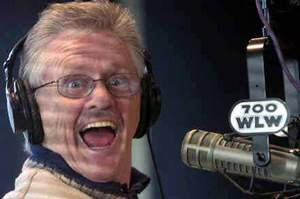 |
| Gary Burbank,
long-time WLW-AM afternoon radio host is retiring effective December
21. He says he just can't help mugging for the camera. |
Burbank's talent to do different voices
with amazing nuance, along with his devilish satirical take on pop culture,
has let him create a world of rich characters that have had surprising
staying power. Earl Pitts seems as sarcastically relevant today as 20 years
ago, if not more so.
Shock jock humor would become the norm over the years in radio, making
Burbank perhaps sound tame. But his satire and wacky characters were
considered pretty edgy in the early '80s. At that point, Cincinnati radio
humor was in the gentle and often corny realm, such as Jerry Thomas' Granny
and the more cerebral dry wit of WLW's James Francis Patrick O'Neill, who
Burbank replaced.
"Gary Burbank raised the bar for the industry and for radio in this town,"
said Eddie Fingers, the 22-year morning host at WEBN-FM. "He, and a very few
other guys, were out there trying to figure out where the edge was. For
better or worse, he helped the rest of us punks find it."
Burbank's characters proved the old theater-of-the-mind adage that radio
purists still love the medium. Burbank regrets he got involved with
producing a TV sitcom pilot of Earl Pitts in the late '80s. "They've always
fallen short," Wolfe said about the TV attempts. "The radio stuff has always
been strong. There is no Earl Pitts TV show, but he's still on 150 stations.
He is an audio character and always will be."
|
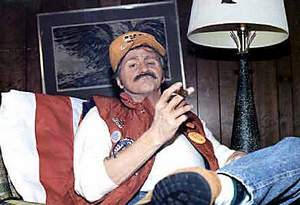 |
|
One of Gary Burbank's
most famous
characters is Earl Pitts Uhmerikun. |
"People kid about having the face for
radio. I have a brain for radio," Burbank said. "I really do. I have trouble
on TV because it never occurs to me to look like what I sound like."
Burbank realizes his characters should stay locked up in people's minds. For
example, he remembers the businessmen from Dallas who came into his
Burbank's Real Bar-B-Q restaurant because they heard Earl Pitts might be in
the house. They were fans of his commentaries airing on a Texas station.
"I looked at the guys and suddenly realized if I told them I was Earl Pitts,
it's like saying there is no Santa Claus. I walked up and said, 'I hate to
tell you this, but Earl just left. Let me buy you a beer.' So they started
telling me Earl Pitts' stories. They didn't want to see me. They wanted to
see Earl Pitts."
Burbank just gets a twinkle in his eye when it's pointed out Earl's "news of
the right wing" may actually be Burbank's "news from the left wing."
"Earl is tongue-in-cheek," he says. "Hey, there are times Earl makes a good
point and then you agree with him. But you have to go, 'Wait a minute. How
can I agree with this moron?'"
Then there is Gilbert Gnarley, the befuddled, drunk or senile (take your
pick) prankster who calls businesses with dazed and confused questions.
Burbank says there are more than 400 of those bits and he figures Gilbert
has left his mark.
Gilbert once called the Mrs. Butterworth's syrup company and complained
about the "protrusions" on the bottle because he "he was becoming enamored
with the syrup as he tried to pour it." A few months later Burbank noticed
the design of the bottle had been changed, removing Mrs. Butterworth's
bosom. Gilbert called back. "He was cheated out of two protuberances. (As
Gilbert), I'm missing two breasts of syrup."
Burbank, born Billy Purser, started in radio in his native Memphis after a
brief career as a session and touring drummer. He says he got kicked out of
Junior Achievement so he started hanging out at radio school. "I just
thought it was so cool to stand and watch the guys at radio school."
He landed a job in Memphis at WMPS where he called himself Johnny Apollo. He
moved to a Louisville station in the late '60s, changing his name to Gary
Burbank (after legendary announcer Gary Owens, who was on "Laugh-in" at the
time with the line "from beautiful downtown Burbank.")
He became a program director at WNOE in New Orleans, then the morning man at
legendary top-40 station CKLW in Windsor, Ontario. Burbank acknowledges that
was where he made a name for himself. "I just happened to be there when they
had a great (ratings) book and suddenly I was the savior of the radio
station," he said.
In the late '70s, he moved back to Louisville at WHAS to be near the family
of his wife, Carol. They have been married 35 years.
Like most broadcast veterans, Burbank laments consolidation's effect on
radio's creative juices. He notes major corporations look at the bottom line
and show little regard for nurturing talent: "I do feel like a dinosaur. I'm
the last dinosaur. I'm the last to feel the affects of the meteor. And the
meteor is probably called 'corporate radio.'"
|
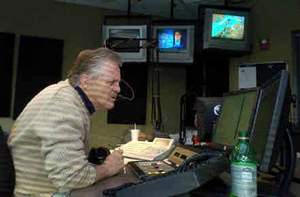 |
|
Gary Burbank squints
as he reads the computer monitor during a break on his show. |
Burbank notes corporate programmers have
followed a tired formula of putting on shows "with a bunch of angry white
me. The comedy is smash mouth. They think 'Friday Night Smackdown' is high
comedy." He sees signs the humor pendulum swinging back to his brand of
clever social and political satire. pointing to Jon Stewart's "Daily Show"
and "South Park."
When asked what he will miss most about his show, he hearkens to his first
love - music. Burbank grew up in Memphis' rock and soul stew, befriending
the likes of Rufus Thomas and doing session work at Stax recording studio.
He went through grade school with legendary blues guitarist Steve Cropper.
"The thing I will miss most about radio is sitting down one afternoon and
having a great band play for you,'' Burbank said. He has been a champion of
local music. He remains frustrated the Cincinnati-area music scene is not
better supported. "This city is blessed and people do not realize it. They
need to wake up and go see some live music. I think it's better than
Memphis."
Burbank is instrumental in forming a non-profit group to be called Play it
Forward, now in organizational meetings, that will help pay medical expenses
of working musicians. He hopes to produce a fund-raising CD to kick off the
effort early next year.
Burbank plans to use his free time writing songs and playing the guitar. He
says his drumming days are over because of his asthma. He will continue to
split time between his digs on the Rainbow River in Florida and his Northern
Kentucky home. He will continue to enjoy his five grandchildren (all girls)
who live in the Kentucky area. "Not much will change for me," he said.
"Except in the afternoon. instead of doing a radio show, I'll take a
motorcycle ride." |
|
The
following appeared in the Cincinnati Enquirer on December 18, 2007: |
|
Gary Burbank must be off
Gilbert Gnarley retiring, too (but not Earl Pitts)
By John Kiesewetter
Just four more days.
Four more days for Gary Burbank fans to laugh all the way home with redneck
commentator Earl Pitts, "retired eccentric" Gilbert Gnarley and his other
crazy characters 3-6 p.m. on WLW-AM (700).
Four more days for Burbank, who doesn't sound like he turned 66 in July, to
close his show by saying, "I must be off! Bah!"
Sure, he's been threatening for 10 years to retire. But "this time he's bein'
honest wich you," to paraphrase another of his characters, the Big Fat
Balding Guy.
"Let's face it, at my age, if I don't stop now, I'm not going to stop," says
Burbank, who signs off Friday. He's the longest-tenured personality on the
region's top-rated station. He was No. 1 in afternoon ratings in the summer,
as he often has been.
|
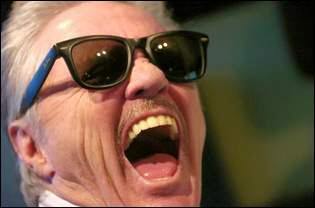 |
|
Burbank in character
as blues singer
Howlin' Blind Muddy Slim. |
For 27 years - the last 25 in afternoon
drive-time - Burbank has been schticking it to us with satire, comedy
sketches, funny phone calls and his daily "Sports or Consequences" trivia
show.
With help from a half-dozen freelance writers and a trio of sidekicks, he
produces "more original humor in a week than all the radio personalities
combined in this market," says his boss, Darryl Parks, Clear Channel AM
operations director.
"I want to see what it's like not to have this kind of pressure to be funny
every day," says Burbank.
"It's one thing if you're Jay Leno, and just do one-liners, and have a ton
of writers," Burbank says. "Jon Stewart does just a half-hour a day. But
three hours a day, for 25 years?
"Some days I sit down and my brain is empty. That's my official reason for
retiring: My brain is empty."
Although WLW will not announce Burbank's replacement until next month, it is
not expected to continue comedy.
Sidekicks John "Duke Sinatra" Davies of Mount Washington and producer Rob
Ervin of Hamilton anticipate losing their jobs. (Producer J.D. "Slim Tempo"
Riggs works for Burbank Creations, his merchandising company.)
"We will make an announcement in January. I don't want to do anything to
overshadow what Gary has done at this station and his career. I want Gary to
go out on top," Parks says. Reruns will air through Dec. 31, when his
contract expires.
For Cincinnati radio, Burbank's retirement is the end of an era that dates
to the 1960s fictional world of WLW's James Francis Patrick O'Neill. When
Burbank arrived in 1981, after success on two Louisville stations, he would
record prank calls on reel-to-reel tape, splice it with a razor blade and
literally tape bits together. Now his co-workers record and edit comedy
pieces on a computer at Clear Channel's Kenwood studios.
"Gary makes it sound easy, but it isn't. They put in hours of show prep for
each three-hour broadcast," Parks says.
Before coming to WLW, Burbank "did it all himself. He didn't have a pack of
writers," says Kevin "Doc" Wolfe, a Cincinnati advertising writer and former
Burbank sidekick (1981-2000). "He did all the voices. I was amazed at how he
could do two characters at once."
Burbank has been doing voices since his first radio job, playing records as
DJ "Johnny Apollo" on KLPL-AM in Lake Providence, La., in 1964. The Memphis
native got into radio after a brief career as a drummer with the Mar-Keys, a
Memphis soul band.
|
Burbank's Bits |
A
sampling of Burbank's bits:
Earl Pitts: For 21 years, Burbank has been delivering "news of
the right wing" at 5:25 p.m. with his beer-drinkin' red-neck "Earl
Pitts Uhmerikan." The character was inspired by Burbank's stepfather,
Memphis fireman Raymond Woods, from whom Burbank borrowed Pitts'
trademark opening line, "You know what makes me sick?"
Rev. Deuteronomy Skaggs: One of his oldest characters is the
Rev. Deuteronomy Skaggs from the Little Radio Church of the White
Winged Gospel Truth. Skaggs is based on radio preachers Burbank met at
stations in the 1960s. Skaggs ends each sermon with a plea for money:
"Don't make me holler! Don't make me shout! Turn them pockets inside
out!"
Sports or Consequences: The popular 4-4:30 p.m. call-in trivia
show began in the 1980s, when sports director Andy MacWilliams and "SportsTalk"
host Bob Trumpy agreed to answer one question after the 4 p.m. news.
Burbank dubbed his sports experts the "sufficiandos." Trumpy, who left
WLW-AM in 1990 for NBC, started the victory chant still heard today:
"We Don't! We Don't! We Don't Mess Around! Hey!" |
CINCINNATI'S FAVORITE SOAP
Over the years, his imaginary friends have expanded to include terminally
confused Gilbert Gnarley; the vocabulary-challenged Synonymous Bengal (who
doesn't want to "besmirch his reparation"); blues singer Howlin' Blind Muddy
Slim; the "All My Bengals" soap opera; and the syndicated Pitts
commentaries, one of the nation's longest-running radio bits (21 years).
Pitts will continue on WLW, probably during Jim Scott's morning show, Parks
says. Burbank also plans to produce "All My Bengals" - "Cincinnati's
favorite soap opera!" - next fall.
"It's a wonder there aren't more traffic accidents on I-71, I-75 or I-275
from drivers laughing their heads off," says fan Mike Wolber, 51, of Amelia.
"Gary's originality, voices, characters and predominately G-rated humor is
timeless. He is a true Cincinnati radio icon."
Rebecca Heckman, Princeton High School science department chair, has been a
fan since she was in junior high.
"Gary is great to listen to after a long day at work. I can't imagine life
without Gary Burbank," says Heckman, 40, of Hamilton.
As Burbank began counting down the final days, he's been touched by fans who
remember routines or lines from decades ago.
"You don't really think about the friends you have that you don't know.
People tell me: 'My father was on his deathbed, and one thing that made him
brighten up is you.' The fact that you've been a good companion that was
needed, that makes you feel a little more worthwhile," he says.
|
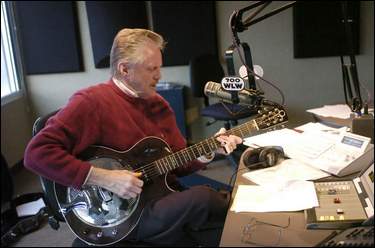 |
|
Gary Burbank warms up
for a blues tune on his WLW-AM radio show. He'll retire after his last
live show Friday, bringing an end to 27 years of local radio satire,
characters and trivia in Cincinnati. |
'IT STILL HASN'T HIT ME YET'
Many listeners don't know that Burbank has frequently done his part of the
show from his Florida home. Ten years ago, Burbank planned to move his
entire show to Universal Studios in Orlando, but the deal fell through.
For a while in the mid-1990s, the show was nationally syndicated. Now it
airs nationwide on XM Satellite Channel 173. He plans to split time between
Northern Kentucky and central Florida after retiring.
"It still hasn't hit me yet," he says. "I'm sure the day I walk out of here,
maybe on my drive home, there will be some heavy thoughts entering my head.
Or I'll wake up Jan. 14, and realize I've got nothing to do."
His creative focus next year will be helping area musicians. He's organizing
Play It Forward, a nonprofit group to raise funds through a benefit CD for
musicians with medical or financial needs.
XM Radio also has expressed interest in bringing Burbank back next year, but
he's not sure how hard he wants to work.
"I know what I don't want to do - another daily show. I wouldn't mind doing
a show once a week on tape. I want to be able to take off for a whole month
if I want to.
"I've never retired before, so I just don't know what I'm going to do."
At least not for four more days.
|
Burbank's Life and Times |
• Born: July 29,
1941, in Memphis, Tenn.
• Residence: Alexandria.
• Music: Was drummer for his own band in high school, the Red Hots;
did studio sessions and toured with the Mar-Keys Memphis soul band in
the early 1960s. Also plays guitar and slide guitar, and writes music.
• Radio: Started as DJ Johnny Apollo at KLPL-AM in Lake Providence,
La., in 1964. Four years later moved to Louisville's WAKY-AM as Gary
Burbank. After a stint at powerhouse CKLW-AM in Windsor, Ontario
(1974-76), he went to Louisville's WHAS-AM (1976-80). Came to WLW-AM
in 1981 as morning host, and moved to afternoons in early 1983. Has
syndicated Earl Pitts commentaries for 21 years (now on 160 stations).
• Awards: He's the only person to win back-to-back "personality of the
year" Marconi Awards from the National Association of Broadcasters
(1990-91).
• On the record: His novelty record "Who Shot J.R.?," based on TV's
"Dallas" cliffhanger, made the Billboard charts in 1980.
• Merchandise: Sells Earl Pitts wear, and CDs of Pitts, Gilbert
Gnarley and his favorite bits, at http://www.earlpitts.us/, and
800-327-5748.
• Book: Greg Hoard, Cincinnati Gentleman magazine editor and author of
Joe Nuxhall's "Joe: Rounding Third and Heading For Home," is writing a
book about Burbank for release late next year.
• TV: He will tape several CET interview shows about his career for
broadcast next year.
• Restaurant: His passion for hickory-smoked pork shoulder barbecue
resulted in the opening of Burbank's Real Bar-B-Q in Sharonville in
1989.
• Comic inspirations: Jon Stewart and "The Daily Show," Monty Python,
Stephen Colbert, "The Simpsons," "South Park," "My Name Is Earl,"
Jonathan Winters, Robin Williams, Ernie Kovacs, David Letterman.
• Claim to fame: Was picked up by Elvis Presley while hitchhiking as a
kid on Peabody Street in Memphis. "He was in an old Chevrolet panel
truck. He just drove us around and waved at girls," he says. |
WAITING IN THE WINGS?
WLW-AM managers won't hint who will replace Gary Burbank in January. Here
are some possible candidates:
• Scott Sloan, 9 p.m.-midnight host who's pre-empted most nights during the
Reds season.
• Tracy Jones, weekend Reds post-game show host, possibly with a co-host.
• Eddie Fingers, morning host at sister WEBN-FM who has filled in for
Burbank.
• Andy Furman, former WLW-AM "SportsTalk" host who lost his
"SupertalkFM96.5" show in the WFTK-FM (96.5) format change Friday to "96
Rock."
Burbank expects his comedy show to be replaced by talk, for consistency with
Bill Cunningham, Mike McConnell and Sloan.
"I don't fit in with Cunningham and Sloan. I'm not an angry white guy. I
stick out like a sore thumb. But I didn't mind," he says. |


|